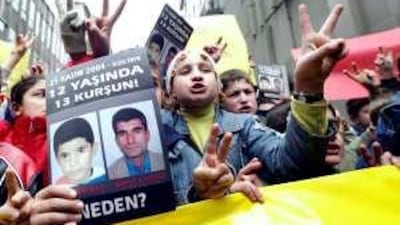ISTANBUL // On a November day five years ago, Turkish police stormed the house of Ahmet Kaymaz, a lorry driver in Kiziltepe, a town in the country's Kurdish region in south-east Anatolia. Acting on a tipoff that Kurdish rebels were hiding in the house, the officers opened fire immediately. Kaymaz and his son Ugur, age 12, who witnesses said were unarmed, died on the spot. Nine police bullets were later found in the boy's back. But Turkey's top court of appeals has ruled that four policemen who took part in the raid and were charged with the deaths of Kaymaz and his son had acted "within the limits of self-defence", according to Turkish media reports. The court last week issued a non-guilty verdict in the case of the four officers, who had already been acquitted by a lower court. Such verdicts are contributing to a culture of impunity that makes it hard to tackle abuses by the police force of this EU candidate country, human rights advocates say. "Policemen have nothing to fear," Evren Ozer, a researcher at the Ankara-based Human Rights Foundation, a leading rights group, said in an interview yesterday. Although the government has promised a policy of "zero tolerance" towards torture and ill-treatment, more than 50 people have died in police custody and during armed police actions since a law giving the police more powers was introduced two years ago, the foundation said in a report written by Mr Ozer and made public last week. According to the report, 13 people died in police custody in the two-year period and 40 people lost their lives when police raided houses, opened fire on suspects or used force to break up demonstrations. Noting that international norms said police were only allowed to use firearms if the lives of officers or others were in immediate danger, the report said the past two years had shown that Turkish police were much more trigger-happy. "The right to use firearms that was given to them has been used in the broadest sense." In the two years since the Law of Police Duties and Rights came into effect, 416 cases of torture and ill-treatment by security forces were reported to the rights foundation, the report said. Among the reported cases were 230 beatings. "Security forces frequently used heavy and disproportionate force during search operations, identity checks and operations aimed at preventing crimes, in police cars and during police custody," the report said. Instances of human rights violations by police, it said, were not isolated cases, but "systematic". The police law was introduced after security forces claimed that previous regulations, which had been introduced to bring Turkey into line with EU norms, were preventing the police from fighting crime efficiently. But Turkish newspapers reported yesterday that crime rates in the country have risen despite the new law. As in the case of Kaymaz and his son, Turkish courts are seen to be reluctant to punish police officers, even if unarmed people die during a police raid. "Our feeling of justice has really been injured," Resat Kaymaz, Ugur's uncle, said about the non-guilty verdict rendered in the case. "These people were civilians." Mr Kaymaz told Turkish media he wanted the case to be heard by the European Court of Human Rights in Strasbourg, France. Mr Ozer, the human rights researcher, said Turkish laws were "very clear" about banning torture and abuse, but the courts had a tendency to let police officers off the hook. He cited a study by Ankara University two years ago that dealt with the basic ideas governing the approach of judges and prosecutors in Turkey. In the study, one in two participants said human rights could pose a danger for the security of the state. "The state comes first," the study quoted a participant as saying. "Human rights are a bit overrated," another participant said. With that kind of mentality shaping the way the judiciary deals with cases of suspected police violence reaching the courts, there was no deterrence for officers, Mr Ozer said. "There is also a law saying that policemen have to pay fines out of their own pockets" if, for example, the European court in Strasbourg rules that Turkish police had violated the human rights of a citizen and awards damages to the victim. "But the law is not being enforced," Mr Ozer said. The European Union also has said Turkey is not doing enough to bring guilty policemen to justice. "More efforts are needed to fight impunity," the EU said last year in a major report assessing Turkey's efforts to become a member. Last year, Mehmet Ali Sahin, the justice minister at the time, broke new ground by publicly apologising to the relatives of a torture victim, Engin Ceber, who died from severe head injuries after being beaten in custody following his arrest for distributing a left-leaning magazine. A total of 60 people, among them prison guards, policemen and a doctor, were charged in Ceber's death. The trial against them continues. Mr Ozer said the minister's statement concerning Ceber's death, while remarkable, was unlikely to solve the wider problem of police violence. "Ceber was just one case," Mr Ozer said. "Our report lists many other deadly cases." tseibert@thenational.ae

Anger after officers who killed Kurds are cleared
The acquittal of Turkish policemen who shot a man and his 12-year-old son reinforces the perception that the police are above the law.
Most popular today
